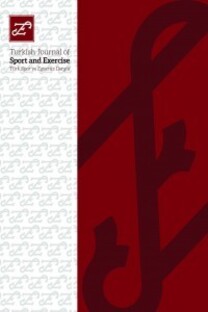Examination of self sufficiency beliefs of the physical education and sports academies students towards english lesson
This
research was conducted to determine the self sufficiency beliefs of the
students study at different departments at Erciyes University and Selcuk
University Physical Education and Sports Schools in 2014-2015 Academic year.
Totally 511 students, 296 males and 215 females, formed the study group of the
research. Datum of the research gathered by Self sufficiency belief scale about
English and scale was developed by Yanar & Büme. On the gathered datum the
Frequency, Percentage, Arithmetic mean, MannWhitney-U test and Kruskal Wallis
test were conducted. The significance level between the variables and the
difference was considered as 0,05 level. As a result; It has been found that
the students' self sufficiency beliefs for English lessons are low (sleep very
little). While there was a significant difference coincided in favor of men in
the subscale of speech according to gender variable, there were significant
differences found in favor of Erciyes University students in Reading, Writing
and Listening sub-dimensions according to university variance. While there was
no meaningful difference determined according to the department variance that
students study at, there was a significant difference determined in favor of
those who had the highest academic passing grade according to academic course
passing grade variance.
Keywords:
English, physical education and sports, self sufficiency belief,
___
- Aktaş T, İşigüzel B. Yabancı dil öğretmenlerinin erken yaşta yabancı dil öğretimine ilişkin öz yeterlik algı düzeylerinin değerlendirilmesi. International Journal of Languages’ EducationandTeaching, 2014; 3:26-38.
- Anonymous. 2001. Council of Europe: Common European Framework of Re¬ference for Languages. http://www.coe.int/t/dg4/linguistic/source/Framework_ EN.pdf. Date accessed: 27.12.2010.
- Aydoslu U. Öğretmen adaylarının yabancı dil olarak ingilizce dersine ilişkin tutumlarının incelenmesi. Süleyman Demirel Üniversitesi, Isparta, 2005.
- Bandura A. Self sufficiency: Toward a unifying theory of behavioral change. Psychological Review, 1977; 84 (2): 191-215.
- Bandura A. Self sufficiency mechanism in human agency. American Psychologist, 1982; 37(2): 122-147.
- Bandura A. Perceived Self sufficiency in cognitive development and functioning. Educational Psychologist, 1993; 28(2): 117-148.
- Cheng YS. A measure of second language writing anxiety: Scale development and preliminary validation. Journal of Second Language Writing, 2004; 13: 317- 331.
- Crystal D. English as a global language. Cambridge: Cambridge University Press, 1988.
- Çimen S. Eğitim fakültesi öğrencilerinin ingilizceye yönelik tutum, İngilizce kaygısı ve öz yeterlik düzeylerinin incelenmesi. Karaelmas Üniversitesi, Zonguldak, 2011.
- Çubukçu F. A Study On the correlation between self sufficiency and foreign language leaarning anxiety. Journal of Theory and Practice in Education, 2008; 4(1): 148-158.
- Demirkan C. Yabancı dil öğreniminin bireylerin sosyal yaşamına etkisi: Isparta’da öğretmenler üzerine bir araştırma. Süleyman Demirel Üniversitesi, Isparta, 2008.
- DOĞAN M. Yabancı dil öğretimi ve yabancı dilde öğretim. Bilge Dergisi, 1996; 10: 11-14.
- Donald MG. Handbook of Self and Identity. Guilford Press, 2003, 219.
- Genç G, Kaya A. Sınıf öğretmeni adaylarının yabancı dil derslerine yönelik tutumları ile yabancı dil akademik başarıları arasındaki ilişki. Balıkesir Üniversitesi Sosyal Bilimler Enstitüsü Dergisi, 2011; 14 (26): 19-31.
- Hazır Bıkmaz F. Sınıf öğretmenlerinin fen öğretiminde "öz yeterlilik inancı" ölçeğinin geçerlik ve güvenirlik çalışması. Milli Eğitim Dergisi, 2004: (161), [Çevrimiçi,5.11.05]http://yayim.meb.gov.tr/dergiler/161/bikmaz.htm
- Karasar N. Bilimsel Araştırma Yöntemi. Nobel Basın Yayın, 1999.
- Luszczynska A, Urte S, Ralf S. The general self sufficiency scale: Multicultural validation studies. The Journal of Psychology, 2005; 139(5): 439-457.
- Mager RF. I think I can: The importance of self sufficiency in instruction. 1997. http://www.cepworldwide.com/newsletter/i_think.html. Date accessed: 23.01.2008.
- Mamun A, Rahman M, Rahman RM, Hossain A. Students’ attitudes towards English: The case of Life Science School of Khulna University. International Review of Social Sciences and Humanities, 2012; 3 (1): 200-209.
- Memduhoğlu HB, Kozikoğlu İ. Üniversite öğrencilerinin yabancı dil derslerine ilişkin tutumları. Dicle Üniversitesi Ziya Gökalp Eğitim Fakültesi Dergisi, 2015;24: 184-202.
- Mills N, Pajares F, Herron C. Self sufficiency of College Intermediate French students: Relation to achievement and motivation. Language Learning, 2007; 57(3): 417-442.
- Oğuz A. Baysal EA. Ortaöğretim öğrencilerinin İngilizce öğrenme kaygıları ile İngilizce özyeterlik inançlarının incelenmesi. Eğitim ve Öğretim Araştırmaları Dergisi, 2015; 3(4): 122.
- Öztürk G, Saydam D. Yabancı dilde yazmada özyeterlik ve kaygı: Türkiye'de bir durum çalışması. Başkent Üniversitesi Eğitim Dergisi, 2014; 1(2): 10-21.
- Pajares F. Self sufficiencybeliefs, motivation, andachievement in writing: A review of theliteratüre. Reading & Writing Quarterly, 2003; 19(2): 139-158.
- Snyder CR, Lopez S. Handbook of PositivePsychology. Oxford UniversityPress, US, 2002, 278.
- Stern HH. Fundamental Concepts of Language Teaching. Oxford University Press, Oxford, 1983, 373.
- Templin AS, Guile CT, Okuma T. Creating a reliable and valid question¬narie and English test to raise learner’s L2 achievement via raising their self sufficiency. http://www.eric.ed.gov/ERICDocs/data/ericdocs2/content_storage_01/0000000b/80/27/97/57.pdf. Date accessed: 21.12.2007.
- Tok H. Üniversite öğrencilerinin ingilizce dersine ilişkin duyuşsal tutumlarının bazı değişkenlere göre incelenmesi. Milli Eğitim Dergisi, 2010; 185: 90-109.
- Yanar HB, Bümen TN. İngilizce ile ilgili özyeterlik inancı ölçeğinin geliştirilmesi. Kastamonu Eğitim Dergisi, 2012; 1(20): 97-110.
- Başlangıç: 1999
- Yayıncı: Selçuk Üniversitesi, Spor Bilimleri Fakültesi
Sayıdaki Diğer Makaleler
Hakkı ULUCAN, Ziya BAHADIR, Enes BELTEKIN
Mohseni FARNAZ, Memar RAGHAD, Sadeghi HEYDAR
Alireza RABIEEZADEH, Fariborz HOVANLOO, Mehdi KHALEGHI, Hadi AKBARI
Injury by regions seen in greco-roman & freestyle wrestling
Rustam AKHMEDOV, Bilal DEMIRHAN, İbrahim CICIOGLU, Kanat CANUZAKOV, Mehmet TURKMEN, Mehmet GUNAY
Rustam AKHMEDOV, Bilal DEMIRHAN, İbrahim CICIOGLU, Kanat CANUZAKOV, Mehmet TURKMEN, Mehmet GUNAY
Harun AKYOL, Metin BAYRAM, Gokhan BAYRAKTAR, Erdogan TOZOGLU
Musa CON, Mehmet Yalcin TASMEKTEPLIGIL, Taner TUNC, Yesim DENIZ
